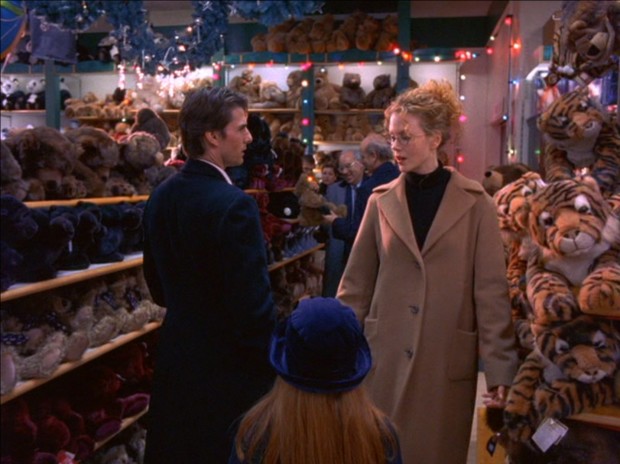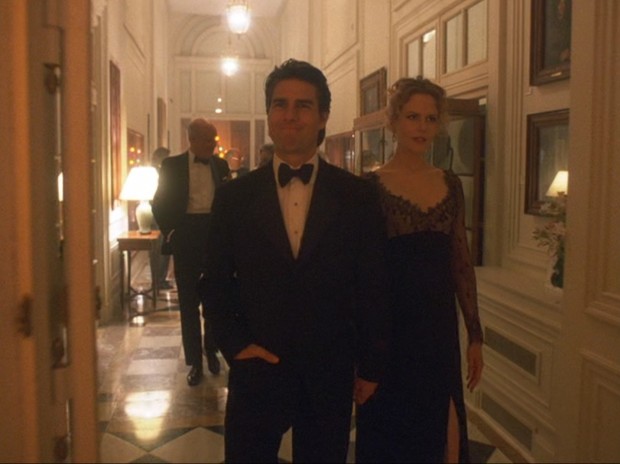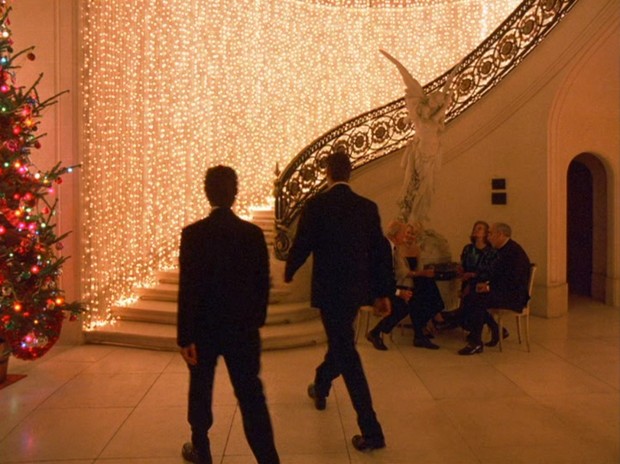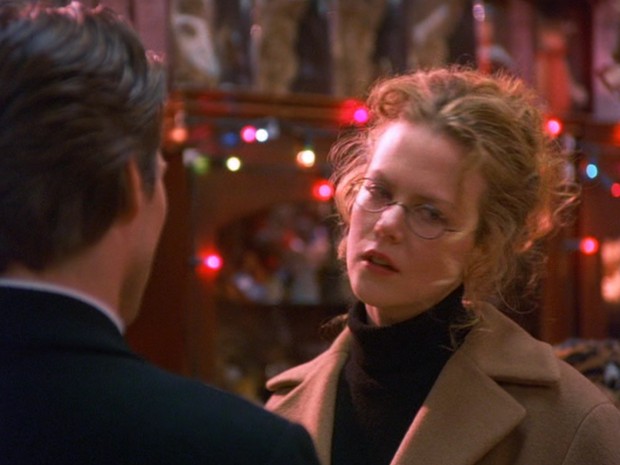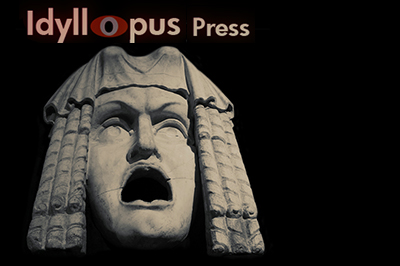Eyes Wide Shut - Resolution with Helena in the Toy Store
Go to TOC for this film ( (which has also a statement on purpose and manner of analysis and a disclaimer as to caveat emptor and my knowing anything authoritatively, which I do not, but I do try to not know earnestly, with some discretion, and considerable thought).
A sub-story that, at first glance, appears to be fairly disturbing occurs at the end of Eyes Wide Shut and is largely obscured within the film's cap stone conversation between Bill and Alice.
As Bill and Alice talk, he questioning her about what they should do, they settle in an aisle framed with stuffed bears and tigers. Beyond them are two men looking at one of the bear toys.
Helena enters the camera frame and briefly stands between her parents as the men replace the bear on the shelf in an area where it doesn't appear to belong, amidst a row of bears of another style.
These two men beyond--the shorter, a balding man with glasses and in a grayish coat; the taller, a balding man in a dark coat--resemble two men observed at Victor's holiday party.
They are both first seen, the taller man first, then the shorter in the glasses, following after Bill and Alice as they progress down the hall to enter the room with the great stairway, having just arrived at the party. As Victor and his wife speak to Bill and Alice, these two men and the women with them are observed also entering and leaving that area, the man with the glasses having always attracted my attention as he figures into the crossfade to the ball room scene following, he stepping forward to greet a woman in the hall to the ball room and Alice and Bill following after him.
The man in the glasses who plays with the bear at the toy store doesn't just resemble but appears to be the same man as at Victor's. His companion at the toy store may also be the same who was his companion at Victor's, but I'm less certain about this though they share the same shape of head and pattern and extent of baldness. If it isn't the same man, that he resembles him as closely as he does would mean we should think he is the same man if we notice these individuals at all.
They, unlike the majority of Kubrick's extras, are positioned to stand out. Examining the bear in the toy store, the pair draw attention as they are centered in the middle of the frame, between Bill and Alice, and above Helena.
They stand out at Victor's party as when Bill is taken up to Victor's bathroom we see them seated beneath the statue of the angel's kiss at the foot of the stairs.
The why of these two men seated at the foot of the angel's kiss statue with two women when Bill is led up the stairs to Victor's bathroom had always puzzled me because it meant they were placed to prominently stand out. But why? It was only later that I realized the similarity between them and the two men in the store.
I wouldn't think much of this except that as Helena moves beyond her parents to look at the bear the two men have replaced on the shelf, that action having attracted her attention, there also enters an individual, from the right, who appears to be a waiter who was numerous times observed while Sandor was finessing Alice by the bar at Victor's.
He is
the same waiter who served Alice her champagne as she exited the dance to go to the bathroom at Victor's.
But here is what is most disorienting and troubling about the scene. Little Helena looks back at Bill and Alice as she follows behind the two older men.
Helena faces away from Alice and Bill, bypassing the bear to follow the two men, and the man who was the waiter steps forward and between the parents and the girl.
Then Kubrick cuts to an extreme close-up of Alice turning away and giving her complete attention to Bill.
That is the last we see of Helena, she following the two men who had entered Victor's party behind Bill and Alice, who had been seated around the angel's kiss statue when Bill was called upstairs to attend to Amanda, and then the man who had served Alice champagne cutting between Helena and her parents. Despite the hope suggested at this film's end, it is a decidedly unsettling scene, especially so if one is a parent.
Some may possibly recollect the threat against Bill's family made by the red-cloaked hierophant at Somerton and take the reappearance of these men, and their presence around Helena, as a realization of that threat. My inclination is to view the story of Bill's journey in a positive light, however, and I don't think Kubrick would have left us with the prospect of little Helena taken captive, as was Helen of Troy, at least not in any literal way.
We do have the problem of Helena and any possible relationship to the Trojan Maze at the center of which was Helen (Somerton--indeed, most of the film is involved with such a maze), but I won't be addressing that here.
Let's assume that my suggestion is correct, that the three men viewed toward the film's end are the same as observed at Victor's party. With the appearance of these men we have circled back to not the very beginning of the film, but Alice and Bill's arrival at Victor's party, and it is at that party where the adventure begins, Alice becoming soused and influenced by Sandor, which eventually initiates her later confession to Bill, and Bill receiving the invitation to the end of the rainbow. Only now, rather than the men ushering Bill and Alice into the party, Helena follows them away and it's the last we see of her.
This is quite different from the book and screenplay, the screenplay closely following the book in having Bill confess his adventures to Alice in their bedroom, they amiably reuniting, and their daughter rushing in with the morning light and cheerfully leaping upon their bed. The book and screenplay end with the portrait of the happy family, the child oblivious to all that has passed and her blithe and loving innocence facilitating the rerooting of her parents in their domestic reality.
So, why should Kubrick choose to end the film instead with the scene in the toy store, where we have these men making a reappearance, separating Helena from her parents, and the camera shifting to focus only on Bill and Alice with close-ups of their faces for the remaining several minutes, never straying below shoulder height so the viewer doesn't consciously look for Helena again and wonder where she is. After all, up to the point of the last discourse between Bill and Alice, Helena has figured prominently in the toy store scene. Once one is conscious of the abruptness of her dismissal, the refusal of Kubrick's camera to show her again becomes increasingly possible to ignore, as well as neither Bill nor Alice looking toward her again.
Convinced as I am that this film isn't intended to end on a fearful note, my resolution for this problematic departure of the daughter was ultimately had via the psychology of the final discourse, the age of their daughter, and what I assume to be one of Kubrick's abiding intentions with his films and their curiosities, which is to awaken the viewer's curiosity and invite them to probe more deeply beyond appearances. The end discourse between Bill and Alice has all to do with a sense of reawakening. This in conjunction with Alice's fretting over "forever and ever" causes me to think about the initial "awakening" of most individuals, which happens in their youth with the realization of their mortality and the conundrum of infinity. It's the first real brush with the problem of the physical and the concept of whether or not there may be an everlasting soul that may survive the body's death. It's as if the first bite of Eve's apple, in Western terms, the child entering into knowledge of themselves and their predicament in the universe, sometimes coinciding with a separation from an earlier, easy acceptance of fairy tale and folk figures such as a Santa Claus who can fly around the world in one night, visiting all boys and girls. No adult can ever after absolutely assuage doubt with easy reassurances after this consciousness of self has taken place.
When I was the age of seven, having this awakening, much like Alice I was terrified of the idea of infinity, "forever and ever", and wondered how humanity had survived this knowledge of self except to attempt to attempt to forget it, to forcefully hide the deeper questions from themselves with the numbing brute force of the everyday. Of course, this is an awakening that Alice and Bill have already had, as it comes to all people in their youth. The second awakening they've just experienced is something different, rousing them out of a state of some torpidity of soul, of loss of vital awareness, of a state of being so immersed in the mundane business of their everyday affairs and habits that they have forgotten those selves to which they'd initially woken in their youth, to which they had subsequently fallen asleep again.
Their daughter, Helena, is seven, at just the right age for experiencing that initial awakening, that first bite of knowledge of self. She is in school, learning to read, her milk teeth are being replaced with permanent teeth. When Helena follows after the very individuals who ushered Alice and Bill into Victor's party, and is cut off from Alice's view by the man who served Alice her drink, Alice turning away from her at that point and the parents not noticing her for the remainder of the film, what this reminds me of is that Helena is not only at that age for her first awakening, but that it is something which she must experience. Her parents and all their fairy tales are unable to preserve her from it. And it feels right that Kubrick would include little Helena at the end, in the story of awakening, that which comes to every ensuing generation, and that it would be a point of separation of Helena from the comforting presence of her parents.
That the waiter would be the one who steps between Helena and her parents, Alice promptly turning away, is sensible for it was Alice's drunkenness at the party which aided and abetted her flirtation with Sandor, reigniting also the memory of the Naval Officer for whom she later confessed she would have abandoned all, even her daughter. Which isn't to say that any of these three men are to be taken as literally the same individuals who had been at the party even though they may be played by the same actors. When the actor who played the waiter steps between Helena and her parents, Alice doesn't turn away because she recognizes him.
It seems a reasonable interpretation to me also in respect of how many individuals describe Kubrick's films affecting them. That they feel compelled to think, their curiosity ignited. As if Kubrick intentionally set out to provoke that awakened child who had fallen back into slumber with all the banal answers to life in which the world (school, religion, work) had immersed them. Rather than feeding an easy story, Kubrick plunges the viewer into the world of his film and requires the individual seek meaning.
As noted, this ending is quite different in tone from the book as well as the screenplay. It's hopeful, but it is also bittersweet, and very matter-of-fact, however mysterious. The child travels away from the parents down the path of her own natural awakening to the problem of a self aware life. Helena's separation from her parents at the end of the film is, really, the perfect anticipation for Kubrick's Pinocchio-based A. I..
words or 4 single-spaced pages. A 14 minute read at 130 wpm.
Go to Table of Contents of the EWS analysis
Link to the main film page for all the analyses

